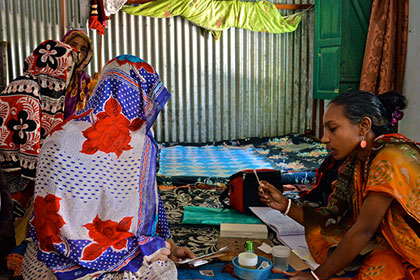Maternal Genitourinary Infections and Adverse Perinatal Outcomes in Sylhet District, Bangladesh (MIST) Study

Location
Sylhet District, Bangladesh
Background
Complications associated with preterm birth are the leading cause of death in children under five years of age. There is strong evidence demonstrating the association of certain maternal genitourinary tract infections and preterm birth. Bacterial vaginosis and urinary tract infections affect women of reproductive age globally, but many of these infections are asymptomatic in pregnant women, and many of these women do not receive appropriate medical care in resource poor settings. We have trained locally recruited women to serve as community health workers (CHW) who visit pregnant women in their homes to screen and treat for abnormal vaginal flora and urinary tract infections.
Study Objectives
- Determine the impact of community-based screening and treatment of women for abnormal vaginal flora and urinary tract infections (UTI) in early pregnancy (13-19 weeks) on preterm live birth
- Evaluate the accuracy of simple, low-cost, point of care diagnostic tests for detecting bacterial vaginosis and UTIs by community health workers in a rural, developing country setting
- If shown to be efficacious, develop a public health screening and treatment program for genitourinary infections in pregnant women living in resource poor settings
Key Facts
- Complications associated with preterm birth are the leading cause of death in children under five years of age.
- Strong evidence shows an association of certain maternal genitourinary tract infections and preterm birth
- Bacterial vaginosis and urinary tract infections affect women of reproductive age globally, but many of these infections are asymptomatic in pregnant women
- Many women do not receive appropriate medical care in resource poor settings
- Local women are trained to visit pregnant women in their homes to screen and treat for abnormal vaginal flora and UTIs
Learn more
Principal Investigator
Abdullah H. Baqui
Local Principal Investigator
Abdul Quaiyum, ICDDR,B
Funding
- National Institutes of Health (NIH)
